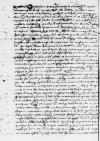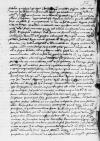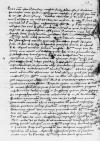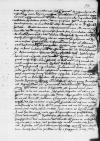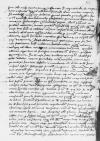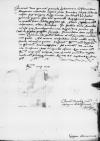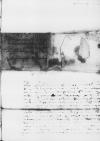Cum longissimas Reverendissimae Amplitudinis Tuae ⌊⌋ 1545-04-27⌊27 Aprilis1545-04-27⌋ datas 1545-08-06⌊sexto demum Augusti1545-08-06⌋ accepissem ac mox deinde 1545-08-13⌊13 eiusdem1545-08-13⌋ ⌊⌋ breviores, quae 1545-05-01⌊principem diem Maii1545-05-01⌋ asscriptum habeb[a]n[t], itemque privatas eodem ipso die a domino ⌊Hosio⌋, quib[us] me de ⌊Π⌋ salvi conductus fraudulenta petitione [cer]tiorem fecerunt, post biduum statim videns rem mo[ram] nullam pati copiosissime domino Hosio respondi, Reverendissimae autem Amplitudini Tuae vix tribus verbis constrictus summa temporis brevitate additoque tantum exemplo litterarum, quas ad dominum Hosium scripseram. Postea vero plus spatii aucupatus vix illud hucusque brevissimum etiam sum consecutus, cum propter ., quae sub ω iudice continuis curis et instructionibus diligentissime tractatur brevique tandem prospero fine iam terminabitur, tum etiam, quod poenitentiarii morte vacua facta sacerdotia plurimum mihi facesserint negotii. Cum enim me frustra meo nomine laboraturum vidi, omnem impendi operam, ut ⌊Ѧ⌋ nomine aliquid impetrarem. Nec in cassum cessit labor, duo etenim impetravi: decanatum scilicet Kielcensem Cracoviensis diocesis, cuius reditus ad 130 ducatos ascendunt, et canonicatum Wladislaviensem, qui itidem opimos habet reditus. Utrumque hoc saecerdotium in nostra est potestate futurum, modo amicorum opera in aula regia obtentum fuerit, ut amborum possessionem ⌊Ѧ⌋ prior assequatur, de quo plura deinceps.
Dum haec agerentur, redditae mihi sunt interea tertiae copiosissi[mae] a Reverendissima Amplitudine Tua ⌊⌋ 1545-06-14⌊14 Iulii1545-06-14⌋ datae, quas secutae s[unt] ante biduum recentes etiam domini ⌊Hosii⌋ litterae postride feri... [di]vi Bartholomei scriptae de illis, qui pro obtinendo salvo c[on]ductu apud F patrocinium suum ⌊Π⌋ impendunt. His omnibus litteris mihi nunc est respondendum. Sed dabit veniam Reverendissima Amplitudo Tua, si in hoc exiguo otio, quod nactus sum, non ad singulas quasque res, sed maxime necessarias tantum respondero. Quibus de causis omnibus modis contendendum sit, ne is
[s]alvus cond[uc]tus (hoc signo . deinceps notandus) ⌊Π⌋ detur, ab exemplo litterarum mearum ad M datarum pridem iam Σ Amplitudo Tua intellexit. Quae, si in aula suum quoque pondus non obtinuerint, plane perdita sunt in ea omnia, sed omnium maxime ipsa X, quae studio curare videtur, ne nihil non invertat ren[o]vetque, quod a F aliquando sit decretum, quamq... iam ceteris fortius patrocinium ⌊Π⌋ suscepisse M scribit. O miseram Poloniam tali regina.
Addit idem magnam vim habuisse sententiam secundum ⌊Π⌋ ante quadriennium Romae latam, postquam una cum litteris ⌊Π⌋ coram F aliisque nonnullis lecta fuisset. Hoc quidem apud imperitos et causae, et morum ⌊Π⌋ in ⌊urbe⌋ vero hic, quia iam dudum evictum est in iudicio multis legibus et apud ipsos quoque cardinales esse non iniquissimam solum, sed etiam insanabilis erroris plenam,
processus nostrae causae nihil officit et e contrario nunc adversarium magis gravat, adeo quippe, ut etiam ipsemet iudex, qui hanc tulit graviter sit ante paucos dies a doctissimo quodam cardinale, qui ceteris nuper accessit processumque diligenter
inspexit, hac de re reprehensus. Quod verum et non a me confictum esse brevi iam omnes (Deo favente) cognoscent, modo hoc rerum optimo statu istisque modernis iudicibus Romae per . aliasque litteras F et X non fuerit ⌊Π⌋ ereptus et maximae cum levitatis nota revocatus.
Atqui longe certe minus valere debuit et facilius falsa agnosci in aula F tam prava cum suo auctore sententia . (cui hoc signu[m] ξ tribuere placuit), ubi praeter iuratos homines, quorum testim[o]nia ibidem producta sunt etiam ceteris omnibus mortalibus, quotquot umquam ⌊Π⌋ noverunt, vel saltem vulgi de eo serm[o]nes audierunt, multo certius clariusque constat eunde[m] Π non innocentem esse quemadmodum in ξ falso pronunciatu..., sed quamdiu apud ecclesia resedit, foedissime, scandalosissi[me], nefandissime, impiissime totam suam exegisse vitam. Intol[e]rabilius adhuc istud fit inde ac inusitatae stupiditatis eorum, de quibus hoc ad me M scripsit iudicium, quod post recitatam ξ cre... coeptum est hunc ⌊Π⌋ non modo insontem esse, sed etiam a Σ magn[a] inimicitia affectum, quasi vero vel Balaam sacerdotes a......
fidelis quispiam gregis Christi episcopus amare posset, adeo impium et pestiferum hominem aut privatum quoque ullum odium quicquam excusaret, tam varia grandiaque, et manifesta illius flagitia.
Quin etiam isti legant saltem paulo attentius hanc eandem ξ et reperient in ea nihil derogari regiae sententiae, ne dicam eandem revocari nec quidem etiam mention[em] eius ullam fieri, minus, quoque ad ullam confiscatam rem cont[ra] ipsam proscriptum restitui. Sed hanc et firmam adhuc mane[re] et illaesam una cum toto processu adversus proscriptum coram reg[iam] maiestatem habito reperient praeterea ibi proscriptum non ab ino[boe]dientia sui ordina[r]ii, a contumacia in regio iudicio commissa, non a mendaciis et fraude, qua primum eluserat ., non a fugae delicto, non a plagio, non a publico et inveterato concubinatu, non ab infinitis prope scandalis cum sua lupa decem et septem annis apud ecclesiam perpetratis, non ab interdicta clericis mercatura, non a scripturarum et litterarum furtis ceterisque non modicis damnis, quibus ecclesiam affecit, non a censurarum ecclesiasticarum contemptu, quae erant in lupam promulgatae, non ab irrisione sacrarum missarum, non alectione haereticorum librorum, non a poenis, quibus ⌊Leonis papae⌋ diploma hoc vetitum facinus extra episcopos et theolog[os] in omnibus plectit, non denique ab ipsa haeresi sacramentaria, qua imbutum esse proscriptum nemo, cui in ⌊Prussia⌋ et alibi satis notus est, ambigit, sed quam ob corrupti iudicis improbitatem et nondum allatos libellos cum regiis litteris ceterisque processus scripturis pontificii fisci procurator sat tunc probare non poterat,
quibus pestem allatis et re melius comperta fuit tum statim idem proscriptus in carcerem contrusus, quod utique fieri non potuisset, si quid innocentiae hanc ξ proscripto tribuere, au... per se validam et non iniustam esse iudicatum fuisset, vel cri... praesertim cum e carcere missus factus non sit, donec post d... annorum et semestre tempus Stanislai poenitentiarii (qui ... et istius facinoris in altero saeculo iustam haud dubie mercedem a Deo accepit) et aliorum quorundam assecta<to>rum non falsis tantu[m], sed etiam contumeliosis in regiam maiestatem eiusque consiliarios commentis perfectum est, non tamen ut absolveretur vel in integrum restitueretur,
sed tantum ... datis vadibus foris carcerem sese intra muros urbis contineret iudicioque sisteret, quoties vocaretur, re tota cum illa adhuc integra manente.
Quae cum ita se habean[t], quae perversitas est per Deum immortalem, quod non potius ...tius, honestius regia etiamnunc illaesa firmaque, et ⌊Romae⌋ m[a]nens iustissima sententia apud suos, ... in ipsa regiae maiestatis a[u]la, vim suam et auctoritatem obtinet, quam haec peregrina ... in[i]quissima et falsissima ξ, quaeque in ipsa ⌊urbe⌋, ubi promul[ga]ta per summam et evidentem iniuriam nullius est prorsus mo[men]ti, sed vituperata cum suo auctore ab omnibus sanae mentis ho[mi]nibus et illo cardinale, cuius supra memini. Quid mult[o] rumpor dolore talia cognoscens, ut vix iam calamum et mentem regam. Semper tamen hoc timui, cum eousque . protrah[eba]tur. Scit enim . atque adeo totus orbis iam novit apud X [ni]hil non esse venale.
Apud nos . in optimo certe statu mo... est et proxima desideratissimo fine, nam et legit iam acta, dicta testium ceteraque huiusmodi, quae ad hanc causam pertinent, fere omnia reverendissimus Sancti Sepulcri, et privatim, qua vivis verbis, qua scriptis instructus est bene, et libros, quoniam illi satis prolixi sunt, ipse vero multis aliis negotiis non ...itor distinetur, magistro sacri palatii, theologo insigni, ad q[uem] hoc ex officio pertinet, evolvendos dedit, ut quos in illis haer[e]ticos damnatosque articulos reppererit, eos annotatos in iudic[io] referat et commissionem, quam pontifici ⌊Perusium⌋ (eo enim h[oc] mense paululum digressus est, reversurus mox sub finem [)], procurator fisci pontificii subsignandum misit, in horas exspectamus. Qua accepta confestim . in carcerem reducetu[r] et torque(!)tur et interrogabitur singulis de rebus multo quam a... hac umquam diligentius et severius.
Post quae, lata tum sententi[a], mox universae huic tragoedia
<e>
finis prosperrimus imponet[ur], modo a novis X machinationibus et . negotium hic aliquot mensibus salvum manserit et constans in sua sententia [F] perseveraverit. Quod utique vere regium est et aequissimum nec aliud citra culpam sinunt tot superiores [F] litterae. Dolo extorserat [N] priorem [.], dolo petit et hunc alterum, cum f...tus iam hic et superatus existit, quaerens extremum remedium.
Prior omnium istarum turbarum causa fuit. Alter iste, si concedetur, perniciosior erit iis de causis, quas copiose 15 Augusti per litteras Σ et M demonstravi. Scribit idem M se una cum L pro virili obsistere, ne impetretur, et ea de re Σ atque P suos etiam nuntios ad F misisse responsumque esse Σ, quod F permissurus non esset, ut eius . illuc rediret, nisi ad ea, quae scripserat ⌊Π⌋, prius Σ respondisset. Ad quam, si tempori meae litterae 15 Augusti datae perferentur, multum his iuvabitur. Istae v... non nisi tarde reddi poterunt. Quodsi tamen imprimis Domini Iesu praesenti auxilio, quo mihi hic itidem presto semper fuit, et hac Σ, L, Mque diligentia praecisus fuerit ⌊Π⌋ apud F . id, quod omnino futurum confido, Reverendissima Amplitudo Tua dubitare cum ceteris non debebit, quin hic intra pauculos dies . felicissime transigetur, ipse ⌊Π⌋ ita tractabitur, ut omnes cognoscent eum innocentem non esse nec fuisse umquam, sed suis et asseclarum suarum precibus, donis, datis, promissis, calumniis, mendaciis et sescentis aliis fraudulentissimis machinationibus condemnationem tamdiu vitasse. Habet istis meis adiunctas ipsiusmet ω litteras, de quo quid sibi promittendum sit, Reverendissima Amplitudo Tua ex illis non obscure intelliget. Dedi eidem et novissimum illud Σ argenteum simulacrum, quod mire gratum habuit. Exspecto igitur avidissime Σ vel M novas litteras de iis, quae fuerint in aula conclusa, pergens nihilominus velis remisque in hoc praesenti optimo statu prosequi . et, quicquid peractum fuerit, celerrime Σ et M denuntiabo.
. itidem irrevocatum firmumque manet et rectissime quoad canonicatum exsecutum est, et exsequetur etiam quoad expensarum litis et quattuor annorum fructuum recuperationem, quicquid blaterent apud vos inimici, quemadmodum Reverendissima Amplitudo Tua ex litteris meis, quas ad dominum ⌊custodem⌋ dedi, fuse cognos[cet], eas enim apertas cum clausula, cui impressum signum est, [ad] illam mitto, ut iis lectis et ab amanuensi transcriptis ca... factaque paulum ad ignem cera a Reverendissima Amplitudine Tua facile obsignari queant, earum enim exemplum per temporis angustiam describere non potui. Apte illi responsum puto et, quorsum oratio mea de . tendat, Reverendissima Amplitudo Tua facile assequetur
simul et illud, non modo inanissimum vel ficticium esse ius ϽI, sed etiam ridiculum et stultum ipsummet +, qui de hoc ausus sit ad nos ⌊Romam⌋ scribere.
Intrepide igitur pergat Reverendissima Amplitudo Tua secundum late descriptam a me in litteris instructionem apostolica diplomata R nomine expedita et pridem ad Reverendissimam Amplitudinem Tuam missa exsequi. Tum si quid + de isto futili iure ϽI obiecerit, idipsum, quod ego illi scribo, respondeat, nec tamen ante necessarium erit respondere, quam per similia apostolica diplomata in tutum expedita ius ϽI et translationem eius in X legitime et sufficienter + vel ipsemet X ibidem in P probaverit, qualia sunt R transmissa diplomata. Ubi haec una tantum bis terque iam a me repetita cautio perpetuo adhibeatur, ut a Reverendissima Amplitudine Tua ordinaria auctoritate omnia fiant, a procuratoribus autem R, non nisi diplomata exhibeantur et possessio modestis verbis petatur, sicque curata erunt bene, ut frustra postea se spoliatum hic X questus fuerit.
Misissem iam et ea, quae ad resignationem ⌊Suchtenii⌋ canonicatus V faciendam requiruntur, sed cum ad illum regressum habet dominus ⌊Snopec⌋ me cedente vel decedente haudquaquam tuto fieret ea resignatio. Quare nunc duorum instrumentorum notas prius mittendas putavi, quo secundum eas procuratores ⌊Romae⌋ dominus ⌊Snopec⌋ constituat, qui eius nomine vel consentiant suspensioni regressus, vel penitus ei regressui renuncien[t] hac tantum condicione, ut semper illi 10 marcarum Prutenicalium pensio annua salva maneat. Si postremum, ut sumat, a Reverendissima Amplitudine Tua inducetur, duobus ducatis hic resignatio transigi poterit, reservato etiam mihi regressu in quosvis eventus V. Sin primum arripuerit mordicusque tenuerit nolens perdere regressum suum, 40 ducatis opus erit ad hanc resignationem. Duplex enim compositio solvenda, altera primi regressus, quae nondum soluta est, solvi autem quandocumque libuerit, poterit, altera suspensionis eiusdem primi regressus. Atqui tum, ut tanti evitentur sumptus, in Ψ potius V admittam. Cuius resignatio si solam supplicationem absque suo diplomate P susceperit (quod spero), non amplius etiam duobus ducatis constabit. Qua in re vix sum Reverendissimae Amplitudini
Tuae responsum moraturus, sed quamprimum ϽI responderit . cesseritque iuri, liti et causae, quod futurum cotidie exspectamus, resignationem Ψ sine mora curabo, siquidem tunc validius et tutius potero, ut et iis, quas Reverendissima Amplitudo Tua demonstravit et multis etiam aliis de caussis V in P praesentem habeat.
Praeterea, cum impetraverim iam . nomine duo illa valde certe opima et honorifica sacerdatia, idem . dudum iam post obitum Felicis Naropinski ⌊Romae⌋ olim defuncti firmissimum quoque ius et minime perplexum ad Posnaniensem canonicatum impetratum, ac nuper ad alterum etiam Lubecensem habet, de quo pridem Reverendissimam Amplitudinem Tuam certiorem feci, in hanc incubui curam, ut efficiam, quo ipse . Wladislaviensem, V Posnaniensem, ⌊Ioanni de Curiis Hartowski⌋ Lubecensem, ⌊Lemanno⌋ resignet, qui secundum Reverendissimae Amplitudinis Tuae consilium, quod mihi vehementer probatur, in locum meum aliquando ⌊Romam⌋ missus in itinere ⌊Lubecum⌋ deflectens, ipsemet ibi eius canonicatus possessionem ingrediatur. Interea nunc datur a . consulto opera, ut ipse prior possessionem quotquot istorum sacerdoti[orum] potest, acquirat, tumque validius resignet. ⌊Lubecae⌋ non repelletur et, ut in ⌊Polonia⌋ idem illi praestetur cum suis, tum cardinalis protectoris aliorumque nonnullas, et ipsius quoque pontificis ad ⌊regiam maiestatem⌋ et Cracoviensem, Wladislaviensem, Posnaniensemque episcopos datis omni diligentia et quoad eius fieri quibit, ceterius curabit.
Ad quos singulos non abs re et Reverendissimae Amplitudinis Tuae accesserint litterae. Ego quidem etiam hac de re ad L et M scribam. Commonebo insuper ⌊Ioannem Hartowski⌋, ut suo nomine conscriptum procuratorium ad me mitta[t], cuiusmodi a V et Y Reverendissima Amplitudo Tua ad me cum antepe...timis suis misit, tale mittat sine mora et ⌊Lemannus⌋. A me hic unicuique mea opera diligentissime praestabitur summa voluntate. Kielcensis decanatus, si eum . semper possidere vel noluerit, vel commode non poterit, mihi (favente Deo) cedet, sub pensionibus tamen mediocribus haec omnia, postulat enim istud illius paupertas etc.
Quamquam vero alii centum ducati haud ita pridem mihi a Fuggeris soluti sint,
tamen ad istarum rerum expeditionem litesque ipsas prosequendas, quibus . maximis nunc agitur sumptibus, vereor, ne non diu suffecerint. Reddetur a me cuiusque nummi iusta ratio. Impraese[ntia]rum vero expensi tabulas descriptas mittere propter tot occu[pa]tiones meas non potui, nam et L non levibus negotiis one[ra]tus sum. Scribunt praeterea ad me multi de suis rebus ex ⌊Polonia⌋, ⌊Patavio⌋, ⌊Bononia⌋. Quin etiam Lovaniensis gymnasii profes[so]res obnixe a me per litteras contenderunt, ut defendendi priv[ile]gia eorum contra certos adversarios onus susciperem. Praesto omnib[us], quod commode valeo, ut vel conservem amicitiam eorum, vel mihi conciliam, sperans hoc aliquando profuturum. Creberrim[e] suis litteris me interpellat .. Committit negotia varia, obsequ[i] et responderi necesse est.
Dies cursionibus absumitur, cum soli mihi subeunda variisque in locis tractanda sint omnia, noc[tis] bona pars vel responsis, vel instructionibus scribendis tribui[tur]. Postea tamen, quam primum potero, conficiam rationaria et privat[a] de P pecunia, prout hactenus semper a me est factum, 30 [ve]ro ducati ⌊Nicolai Fridwalt⌋, cum nondum nova comissio sub meo nomine ⌊Venecias⌋ vel ⌊Augustam⌋ ad Fuggeros a domino ⌊G[eor]gio Hegel⌋ et inde ⌊Romam⌋ missa est, solvi mihi hactenus non potuerunt. Operepretium est igitur, ut ea de re Reverendissima Amplitudo Tua domino ⌊Georgio Hegel⌋ scribat eique fidem faciat, quod volun[tas] sit ⌊Fridwalt patris⌋, ut defuncto iam eius filio mihi hoc aurum hic solvatur. Cui tum de eo, quam petit, perscribam rationem.
Pro decanatu Gutstatensi, quas possum, Reverendissimae Amplitudinis Tuae ago gratias, est enim istud mihi gratissimum sace[r]dotium. Faxit Omnipotens Deus, ut hoc cum gloria nominis sui a me et possideatur, et administretur, cumque curam an[nu]am habet animarum, provisum maxime velim, ne quid i[n] ea me absente negligatur, sed ibidem a ceteris confratribus ex ordine fiant singula. Quod etiam Reverendissimae Amplitudini Tuae cur[ae] futurum non dubito atque, ut sit, quo valeo impensius et humilius obsecro.
. hinc cum pontifice discedens dedit ad Reverendissimam Amplitudinem Tuam alteras litteras. Is, quantum inter huiusmodi soc[iis] licet, satis quidem honeste se gerit et commodus iam, atque frugi ....
Cum illo mihi tanta tamque insperata P ingratitudo et impudens rusticitas usque ad reditum ferenda, dum mutari nequit.
⌊Plemienczki⌋ magnas stultitiae poenas pendit, quandoquidem hic a ⌊Π⌋ omnibus cavillationibus prohibetur, quominus litem obtinere et Culmensem canonicatum possit. Mecum quamvis in gratiam redierit, tamen quoniam nondum ⌊illi⌋ quicquam fido, Reverendissimae Amplitudinis Tuae litteras ei reddere non sum ausus, verum salutare illum tantum, ob id, quia reprehenditur in illis, quod secundum ⌊Π⌋ testimo[nia] dixerit, quod hic licitum omnibus esse volunt et iniquum eum, qui vetaverit. Abest itidem cum pontifice, quo fit, ut nec patris eius litteras redderim, habiturus eas postquam redierit, vel, qui ad illum eas feret, occurrerit certus homo.
Quod α attinet, opportunius fortassis curabitur cum Φ domi, ⌊Lemmanus⌋ ⌊Romae⌋ fuerit. In X casu satis evidens exemplum edididisse. Deus videtur ceteris gentilibus nostris, ne filios suos in tam pravas et haereticas scholas amandent. Ac doleo certe hanc impiam scholam Gdanensi primum sanguine consecratam, seu potius exsecratam esse. Si quid et . humanitus nunc acciderit, lib[er]rimus erit ⌊Langhannio⌋ nostro locus, cui ne vel me, vel ullum alium Reverendissima Amplitudo Tua praeferat, quantis maximis precibus possum, precor. Nam et ipsa sacerdotia, et tam insignis ecclesia tutum virum insigniter efflagitat, et ipse de me aliisque meis hoc ita meritus est. Valeat + cum X, qui sese Σ et Φ adeo leviter et inimice opponere maluerunt, quam meliorem occasionem paulo diutius manere, nec quicquam etiam in iustissima et debita fructuum Ψ petitione et . exsecutione me iuvare.
De X haud scio, quid privatim exspectandum fuerit, qui in Lutheranorum scholis tot annis versatus, nunc etiam vix apud meliores parentes degit. De Accipitre alias plura. Sanequam g[a]visus sum, quod sospes celerque ad Reverendissimam Amplitudinem Tuam re... tulit salva exhiberit eaque omnia Reverendissimae Amplitudini Tuae tantopere placuerint. Nunc iterum per Stanislaum Dombrowski mitt[o] libellum de episcopo, tandem hic
venumdato repertum, et alterum defensionis iudicii universitatis cleri Coloniensis adversus ⌊Martinum Bucerum⌋, ⌊Philippum Melanchtonem⌋, Ioannem Oldendorpium et ceteros eorum asseclas.
Cui a tergo assutum est novum etiam opusculum Wintoniensis episcopi Angli contra eundem ⌊Bucerum⌋. Plura mittam contra has sectas, cum iterum, qui ferre volent, nuntios accepero. Sunt enim hic non pauca, quamvis cariora. Sed pretium superat utilitas eaque desidera[ndum] munus Reverendissimae Amplitudini Tuae et locus, in quo haereticis undique saepta moratur et moderna tempora.
De morte G statim hic auditum est, quam Marsupinus O+ nuntius ipsum O+ vehementer dolere dixit et non sine suspicione. Timenda sunt q[ui]dem ea, quae Σ vix ullo cum errore ominatur. Avertat tamen illa Dominus Iesus. Pasquillum de remisso tonsore cum legisset protecto[r] Bembus et alii nonnulli ⌊Romae⌋, ad . in concilium Tridentum misi et eas quoque schaedas, quas de factis a se et vicinis Lutheranis G iustis exsequiorum ad me misit, adiunctas Reverendissimae Amplitudinis Tuae ad . privatis litteris. Qui inde copiose respondens, quicquid praeterea in eo concilio agatur et futurum sperandum sit, Reverendissimam Amplitudinem Tuam non celabit, quod et ultro saepius se iam fecisse mihi scripsit.
Respondi copiosis litteris S ad eum modum, quo Reverendissima Amplitudo Tua consuluit et ego semper faciendum existimavi. Rectius omnia coram aliquando agentur, cum iis turbis p[ro] sua misericordia Deus prosperum concesserit finem. De qua etia nunc minime despero, quantumvis insaniat X quo si ab homine nullo, nec ab honestate, nec ab aequitate vinci se patietur, a potenti tamen dextera Dei tandem vincetur, qui maxime desperatis in rebus ab ope humana praesens suo divino auxilio adest adiutor. Sat quidem ego putabam esse discessionem a nobis multorum hominum et amicorum et totius P. Nunc vero, si et X et ipsam aulam a nobis discedere Deus permiserit, quo nemo sit, qui iuvare possit velitque reliquis, quam ipse solus ad demostrandam clarius potentiam suam et misericordiam erga nos, non tantum non repulsos longius esse nos ab optata victoria, sed ipsam victoriam tum maxime nobis concessurum credam secundum aeternam suam ordinationem, ut benedicamus Dominum in omni tempore, et semper sit laus eius in ore nostro. Amen. Ad cetera, quae supersunt, paulo post in maiore otio rescribam, veniam impraesentiarum petens.
In novis vero quoniam paucula habemus, ea non praetermittam. ⌊Margareta⌋, naturalis caesaris filia, pontificis nepoti ⌊Octavio⌋ nupta, post vinginti duorum annorum sterilitatem his diebus geminos peperit praeter omnium opinionem. Baptissimus(!) puerorum in quartum diem Octobris prorogatus est. Alteri caesaris nomen imponetur, alteri pontificis. In ⌊Gallia⌋ ⌊dux Aurelianensis⌋, qui secundogenitus erat ⌊regis⌋, vita functus est. Ubi et pestem grassari ferunt. Formidatur item novum inter ⌊caesarem⌋ et ⌊Gallum⌋ bellum ob non servatas condiciones pacis. Ad ⌊Renum⌋ conscribitur miles, nulla certa fama adversus quem. Suspicatur reverendissimus dominus Upsalensis in Coloniensiem. Sciemus postea. Id orandum, ut cuncta ita temperet Deus, ne concilio obsint. Qui etiamnum Reverendissimam Amplitudinem Tuam ecclesiae suae et nobis omnibus iugiter incolumem felicemque tueatur.

